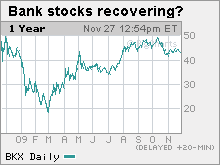Dubai's threat to U.S. banks
Although there's little direct exposure to Dubai World's default risk, U.S. financial institutions could take major indirect hits.
 |
| The KBW bank index has recovered from its March lows but stocks are still on shaky ground. |
NEW YORK (CNNMoney.com) -- The news that the state-run investment company of Dubai requested a postponement of billions of dollars of debt this week could pose a big problem for U.S. banks.
Dubai World owes about $60 billion. It rang up much of that in a building boom that included the world's tallest skyscraper and the Palm Islands in the Persian Gulf, settlements shaped like palm trees.
According to CMA DataVision, which tracks credit markets, there's a 35.82% probability that Dubai will default on that debt.
New York-based Citigroup (C, Fortune 500) has the most exposure to default risk at Dubai World, which a J.P. Morgan (JPM, Fortune 500) equity research note estimated at $1.9 billion. Citigroup declined to comment.
While other major banks in the United States are believed to have little direct exposure, the ripple effect could be more crippling, according to Richard Bove, a bank analyst with Rochdale Securities.
"There could be huge indirect exposure," he said. "One has to assume that U.S. banks will be hurt."
J.P. Morgan declined to comment, while Goldman Sachs (GS, Fortune 500) and Bank of America (BAC, Fortune 500) were unavailable for immediate comment. Morgan Stanley (MS, Fortune 500) said a Dubai World default "would have have no material impact on its earnings."
Bove said the underlying problem is that there is a lot of uncertainty floating around. For example, there's little information available about counterparty derivatives, guarantees that transfer default risk from lenders to other financial institutions. And it's unknown how much of Dubai World's debt guarantee is held by U.S. banks.
And while UK banks, such as Standard Chartered, HSBC (HBC), Royal Bank of Scotland (RBS) and Barclays (BCS) are much more exposed to Dubai World, with a total of more than $30 billion in default risk according to J.P. Morgan's note, U.S. banks have extensive dealings with UK institutions. Those include trading and guaranteeing debt, which could translate into losses for U.S. banks.
There's also U.S. banks' interactions with their German counterparts. Dubai has loaned a lot of money to Eastern European nations, as has Germany. Any losses from defaults there could expose U.S. banks to some risk.
Finally, there's the impact of already reeling commercial real estate markets worldwide.
"Dubai may have to unload some very prestigious properties at distressed prices, and this will drive the price of all commercial real estate lower," said Bove. "That would clearly be a problem for American banks."
Bove also posited that the problems at Dubai World could add weight to the growing sentiment that is already strong in the U.S. Congress about beefing up regulation.
"Congress is demanding that anyone connected to the U.S. financial system has to be regulated," he said.
Bank stocks are particularly vulnerable to a market turndown triggered by the Dubai crisis, said Peter Sorrentino, senior portfolio manager at Huntington Asset Advisors. He said the run-up this year has led to an overvalued stock market.
"We had been looking for something to trigger a correction," he said. "This could be that catalyst."
It would add to a market already made volatile, especially with the approach of the end of the tax season for mutual funds, which has put a lot of money in motion. The impact could fall heaviest on the financial sector.
Sorrentino added that the risk of default will put a damper on all commercial credit markets. Institutions may have to set aside more reserve funds to cover default risk, leaving less cash to lend out, and, in general, take a more cautious underwriting approach.
If lending does decrease, that could cut into bank profits. ![]()


